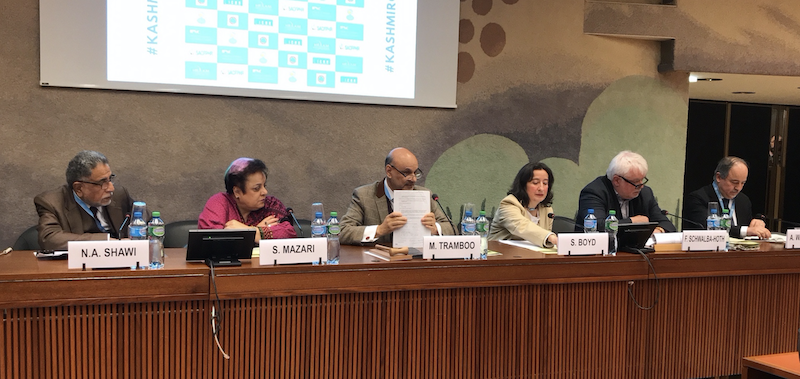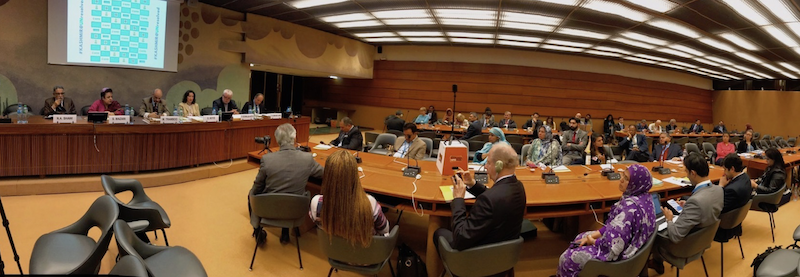PRESS RELEASE
CALL FOR UN HUMAN RIGHTS COUNCIL PANEL DISCUSSION ON UN KASHMIR REPORT
Geneva, 2 March 2019 – The First Conference on the UN Report on the Situation of Human Rights in Kashmir was conducted at the Palais des Nations (United Nations) calls for holding a “Panel Discussion” in the United Nations Human Rights Counsel (UNHRC) on the UN Kashmir Report that may lead to the formation of an independent enquiry commission to investigate gross human rights violations in Kashmir.
The conference was organised by International Human Rights Association of American Minorities (IHRAAM) with the support of International Muslim Women’s Union (IMWU), International Commission for Human Rights (ICHR) and South Asia Centre for Peace and Human Rights (SACFPHR).
The guest of honour at the conference was the Honourable Minister for Human Rights of Pakistan Ms Shireen Mazari.
In his opening remarks, Barrister A Majid Tramboo of IHRAAM expressed his and the conference organisers gratitude to Ms Mazari for having consented to participate as guest of honour in the conference. He emphasised that the UN High Commissioner’s Report on Kashmir is a crucial testimony on the gross human rights situation in Indian Held Kashmir that should not be left simply on a shelf. It is evidence based document with case reports and very well deserves, to begin with, to lobby for persuading the UNHRC to conduct a panel discussion on the report therefore, the Government of Pakistan with other member states ought to take lead on this. Barrister Tramboo assured the Honourable Minister and others that Non-Governmental Organisations (NGOs) Community is ready and prepared to lobby for the panel discussion and the very presence of huge number of NGOs in the room bespeaks for this. He hoped that this proposition is taken on board.

In his video address, Professor Alfred de Zayas, the First UN Independent Expert on the Promotion of a Democratic and Equitable International Order, said that in 2013, he presented a report to the UN General Assembly discussing issues of self-determination including that of Jammu & Kashmir, and the matter should be taken seriously and appropriate resolutions adopted to refer the case to the international court of justice for an advisory opinion. He referred to and endorsed the report of the UN High Commissioner on the Human Rights Situation in Kashmir, emphasising that there is an urgent need to address the past and ongoing human rights violations and to deliver justice for all people in Kashmir who have been suffering 7 decades of conflict. Any political resolution should entail a commitment to end the cycle of violence and abuse committed and redress for the victims. He hopes that UNHRC will address the issue of Kashmir as the situation is intolerable for all those victims who have suffered because of their aspirations to exercise their right of self-determination enshrined in article 1 of the UN Charter, article 1 of the International Covenant on Civil and Political Rights and the International Covenant on Economic, Social and Cultural Rights. He further asked the authorities in India to adhere to the recommendations of the UN Kashmir Report including fully respect international human rights law obligations in occupied Kashmir, repeal AFSPA which provides impunity for crimes committed by Indian armed forces, establish independent impartial and credible investigations to probe all civilian killings, as well as obstruction of medical services, arson attacks on schools and incidents of excessive use of force including serious injuries caused by the use of pellet guns, investigate all deaths under the pretext of “security operations” as well as abuses.
Ms Shireen Mazari, Pakistan’s Federal Minister for Human Rights in her lead speech affirmed the Government of Pakistan’s continued support for the people of Indian Occupied Kashmir, terming their struggle for the right to self-determination as a just cause. She referred to the UN Resolution on Women Peace and Security, which specifically pinpoints to protecting women in conflict zones and highlighted the gross human rights violations against Kashmiri women and children, particularly the Indian state’s use of mass rape as a weapon of war, use of civilians as human shields and the indiscriminate use of inhumane weapons such as pellet shotguns on minors. Referring to the recent attempts of India to escalate tensions between the two neighbours, she expressed Prime Minister Imran Khan’s hope for peace through dialogue instead of war between the two nuclear powers as echoed by the rhetoric espoused through the Indian media. Ms Mazari informed the audience of a conflict resolution model she has developed and submitted to the office of Prime Minister Imran Khan in a hope to build towards resolving the Kashmir issue peacefully, pressuring India to answer why it would not enter dialogue when offered an alternative to war. She criticised India’s bizarre narrative that Kashmir is an internal issue, considering that it was India that took the matter of Kashmir to the United Nations Security Council to begin with, under Chapter 6, settlement of disputes. India recognised in 1948 that Kashmir is an outstanding issue between the two UN members and thus called on the UN to intervene and resolve it. She further added that India’s own law and constitution recognises that Kashmir is not an integral part of India stressing that the international community must point out to India that they are in violation of International humanitarian laws, especially the Geneva Conventions as Kashmir is evidently an active zone of armed conflict. Pointing out the relevance of Kashmir for the security of South Asia, Ms Mazari noted India’s recent attack on Pakistan without any evidence or actionable intelligence leading to a potential war, had it not been for Prime Minister Imran Khan’s statesmanship. She accused India of war mongering as a method of electioneering, as reflected by India’s own media, and appealed for dialogue or risk turning the region into a nuclear flashpoint. Ms Mazari announced at the conference that Prime Minister of Pakistan Imran Khan declared in the joint session of the parliament to release the Indian captured pilot.
Professor Nazir A. Shawl, Chairman SACFPHR, began by describing Kashmir as a torn society in every way, a society that wants world to listen to their suffering. He applauded the UN Human Rights
Commissioner’s report, stating that it rightly documented gross human rights violations on daily basis in Indian occupied Kashmir, yet Delhi continues to try and suppress the just and legal demand for the right to self-determination and freedom from illegal occupation. He accused India for not behaving as a democracy, pointing out Delhi disciplines Kashmiris through death, and disburses death through extra judicial means. He insisted that the international community must understand the realities Kashmiris face because of the denial of right to self-determination to them. Prof Shawl described the UN Report as a breath of fresh air after 30 years of conflict, adding that it is a reassertion by the UN for Kashmiris right to self-determination, which is protected by international law, a demand echoing in all parts of Jammu & Kashmir. He declared that Kashmiris are peace loving people, and that any future peace is only possible when dialogue is productive and will only exist when all Kashmiris are included in that dialogue. He quoted the Irish peace process negotiator who said that no actual dialogue between India and Pakistan has started on Kashmir, and that it will only start on the day the dialogue would be inclusive. Prof Shawl concluded by saying there is no peace without justice and no justice without peace.
Mr Frank Schwalba-Hoth, the founder and first MEP of German Greens described the relationship between the European Parliament (EP) and Kashmir as long lasting, pointing out that they regularly looked into Kashmir, particularly during the time of Kashmir Centre EU in Belgium. He recalled frequent productive and effective events under the patronage of Barrister A. Majid Tramboo and detailed the efforts made for such as the resolutions passed on mass graves and delegations from the EU Parliament visiting both sides of Kashmir who concluded a report entitled “The Most Beautiful Prison of the World”. He emphasised that the right to self-determination is the crucial issue in the Kashmir conflict. He appreciated the launch of a new youth organisation in Europe recently and hoped that the team would lobby continental members of the EP as Brexit would render British MEPs defunct. With 350 new MEPs to be welcomed after the new election in June 2019, he announced that there would be an exhibition on Kashmir and a global discourse on Kashmir launched in the EP. Mr Schwalba-Hoth welcomed the proposition of holding a “Panel Discussion” in the UNHRC.
Ms Soraya Boyd, CEO Facilitate Global, stated that it is time to move beyond statements and into implementation phase, especially in a climate of escalating tensions in a geopolitical matrix that includes Kashmir, Pakistan, India, China and Russia. The two most important mechanisms in the UNHRC are universal periodic reviews and special procedures. She added that mechanisms exist but the UNHRC must address non-compliance. She identified the important roles the UN Security Council can play particularly referring to articles 33-37, under which it is in a position to exercise the terms of its mandate, but also the UN can act pursuant to article 12 paragraph 3 of the UN statue. She affirmed that there are a number of things that can be done to engage in the spirit of good will and faith to resolve the issue of Kashmir. She said that it is not a unilateral decision that belongs to India, but must include other important regional parties. Ms Boyd said that India has not been forthcoming and refuse to allow a plebiscite to take place, probably because the result would not be favourable to them. She asserted that India as a member of the UNHRC is not upholding its international obligations of protecting peace, security and humanitarian law. She concluded that India must respect international human rights law in Indian Occupied Kashmir and establish independent impartial international commission of enquiry if it wishes to continue being a valued member of the UNHRC, but also to bring into compliance its domestic laws so to fully align with international human rights standards.
Dr Abdel Wahab El Hani (United Nations – Committee Against Torture), declared that conflict is preventable and so is torture preventable, and no human rights violation is destiny for civilians. Therefore, there is a need to ratify and implement provisions of convention on torture. He acknowledged that in Indian Administered Kashmir there is a lack of access to justice, use of excessive force, killing of civilians and non-combatants, use of illegal pellet shot guns, illegal detentions, enforced disappearances, sexual violence and mass graves, adding that India is in contravention of the UN Convention on Torture. This he said is very evident in the UN Kashmir Report. He recommended authorities of India to respect international human rights law, ratify international instruments and conventions for the protection of all persons from enforced disappearance, torture and inhuman or degrading treatment or punishment. He explained that India has previously, during its UPRs, accepted all recommendations in 2008, 2012 and 2017 but never ratified the concerned instruments and or conventions, making it difficult to prosecute perpetrators of crimes. He concluded by stating that the first step for Kashmiris is to lobby for India to ratify the conventions and implement recommendation by the United Nations Committee against Torture.

The conference concluded with a call to UNHRC to conduct a “Panel Discussion” on the UN Kashmir Report on urgently.
